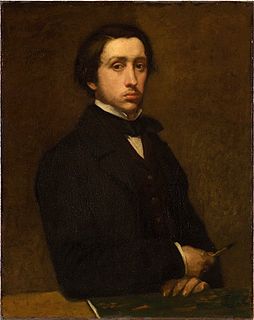A Quote by Harold Rosenberg
Today, each artist must undertake to invent himself, a lifelong act of creation that constitutes the essential content of the artist's work.
Related Quotes
An artist is above all a human being, profoundly human to the core. If the artist can't feel everything that humanity feels, if the artist isn't capable of loving until he forgets himself and sacrifices himself if necessary, if he won't put down his magic brush and head the fight against the oppressor, then he isn't a great artist.
The artist seeks contact with his intuitive sense of the gods, but in order to create his work, he cannot stay in this seductive and incorporeal realm. He must return to the material world in order to do his work. It's the artist's responsibility to balance mystical communication and the labor of creation.
Whatever an artist's personal feelings are, as soon as an artist fills a certain area on the canvas or circumscribes it, he becomes historical. He acts from or upon other artists. An artist is someone who makes art too. He did not invent it. How it started — "to hell with it." It is obvious that it has no progress. The idea of space is given him to change if he can. The subject matter in the abstract is space. He fills it with an attitude. The attitude never comes from himself alone.
Consider the idea of a God who is essentially sadness and longing, yearning to reveal himself, to know himself through a being who knows him, thereby depending on that being who is still himself - yet who in this sense creates Him. Here we have a vision which has never been professed outside of a few errant knights of mysticism. To profess this essential bipolarity of the divine essence is not to confuse creator and created, creature and creation. It is to experience the irrevocable solidarity between the Fravarti and its Soul, in the battle they undertake for each other`s sake.
Why was the painting made? What ideas of the artist can we sense? Can the personality and sensitivity of the artist be felt when studying the work? What is the artist telling us about his or her feelings about the subject? What response do I get from the message of the artist? Do I know the artist better because of the painting?





































